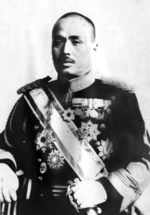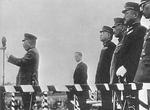Yoshinori Shirakawa
| Surname | Shirakawa |
| Given Name | Yoshinori |
| Born | 24 Jan 1869 |
| Died | 26 May 1932 |
| Country | Japan |
| Category | Military-Ground |
| Gender | Male |
Contributor: C. Peter Chen
ww2dbaseYoshinori Shirakawa was born into a samurai family in Iyo, Ehime Domain, Japan, on the island of Shikoku. In Jan 1884, he enlisted in the Japanese Army. In Jan 1886, he completed his training and became an engineering specialist. In Dec 1887, he was assigned to the Japanese 21st Infantry Regiment. He graduated from the Japanese Army Academy in Jul 1890, and he was commissioned as a second lieutenant in the following year. In Nov 1893, he enrolled in the Army Staff College, but his course work was put on hold in Jul 1894 due to the start of the First Sino-Japanese War. In the following month, before being shipped to China in Nov, he was promoted to the rank of first lieutenant. He returned to Japan in Jul 1895, and resumed his Army Staff College studies in Feb 1896. In Feb 1898, he was promoted to the rank of captain. In Dec 1898, he graduated from the Army Staff College and was made a company commander in the 21st Infantry Regiment. In Dec 1899, he was named an instructor at the Army Staff College. In 1902, he was named the chief of staff of the Imperial Guards Division. In Jun 1903, he was promoted to the rank of major. During the Russo-Japanese War, he was initially a battalion commander in the 21st Infantry Regiment, and was later, in Mar 1905, named the chief of staff of the 13th Division. In Sep 1905, he returned to Japan, and in the following month he was assigned to the Personnel Bureau of the Ministry of War. He was promoted to the rank of lieutenant colonel in Mar 1907. In Dec 1909, he was promoted to the rank of colonel and was named the commanding officer of the 34th Infantry Regiment. In Jun 1911, he was named the chief of staff of the 11th Division. In late 1911, he was promoted to the rank of major general. Between Sep 1913 and 1915, he was the commanding officer of Japanese forces in central China. Returning to Japan, he was named the commanding officer of the Japanese 9th Infantry Brigade. Before the end of the year, he was promoted to the rank of major general. Between 1916 and 1919, he was placed in charge of the Personnel Bureau of the Ministry of War. In Jan 1919, with a promotion to the rank of lieutenant general, he was named the commandant of the Army Staff College. In Mar 1921, he was named the commanding officer of the 11th Division. In Aug 1922, he was named the commanding officer of the 1st Division. Between Oct 1922 and Oct 1923, he served as the Vice Minister of War; starting from Nov 1922, he took on a concurrent duty as the head of the Army Aeronautical Department. In Nov 1922, he was awarded the Order of the Rising Sun. In Oct 1923, he was named the commander in chief of the Kwangtung Army, in which position he would remain until 1926. In Mar 1925, he was promoted to the rank of general. Between Jul 1926 and 1932, he was a member of the Supreme War Council. Between Apr 1927 and 1929, he served as the Minister of War. In Feb 1932, he was named the commanding officer of the Japanese Shanghai Expeditionary Army. On 29 Apr 1932, during a Japanese Army celebration for Emperor Showa's birthday, Shirakawa, General Kenkichi Ueda, Vice Admiral Kichisaburo Nomura, Chancellor Kawabata Sadaji, Consul-General Kuramatsu Murai, and Envoy Mamoru Shigemitsu were wounded by a bomb planted by Korean nationalist Yoon Bong-Gil at Hongkou Park (now Lu Xun Park) in Shanghai, China; Yoon would be arrested on the scene and would be executed on 18 Dec 1932. About a month later, Shirakawa died of his wounds. He was posthumously awarded with the Order of the Rising Sun 1st Class with Paulowana Cluster and the Order of the Golden Kite 2nd Class, as well as being made a baron. Emperor Showa sent Shirakawa's family a personal message of bereavement. Half of his ashes were buried in Matsuyama, Ehime Prefecture, Japan and the other half at the Aoyama Cemetery in Tokyo, Japan.
ww2dbaseSource: Wikipedia
Last Major Revision: Sep 2012
Yoshinori Shirakawa Interactive Map
Photographs
 |  |
Yoshinori Shirakawa Timeline
| 24 Jan 1869 | Yoshinori Shirakawa was born in Iyo, Ehime Domain, Japan. |
| 26 Jul 1890 | Yoshinori Shirakawa graduated from the Japanese Army Academy. |
| 26 Mar 1891 | Yoshinori Shirakawa was promoted to the rank of second lieutenant. |
| 25 Feb 1932 | Yoshinori Shirakawa was named the commanding officer of the Japanese Shanghai Expeditionary Army. |
| 29 Apr 1932 | Yoshinori Shirakawa was seriously wounded by a bomb planted by Korean nationalist Yun Bong-gil at Hongkou Park (now Lu Xun Park) in Shanghai, China; Shirakawa would die of his wounds a month later. |
| 23 May 1932 | Emperor Showa granted Yoshinori Shirakawa words of encouragement as Shirakawa lay wounded in a hospital in Shanghai, China. |
| 26 May 1932 | Yoshinori Shirakawa passed away in Shanghai, China from wounds sustained during a bomb blast one month prior. |
Did you enjoy this article or find this article helpful? If so, please consider supporting us on Patreon. Even $1 per month will go a long way! Thank you. Share this article with your friends: Stay updated with WW2DB: |
» First Battle of Shanghai
- » 1,150 biographies
- » 337 events
- » 44,024 timeline entries
- » 1,242 ships
- » 350 aircraft models
- » 207 vehicle models
- » 375 weapon models
- » 123 historical documents
- » 260 facilities
- » 470 book reviews
- » 28,598 photos
- » 432 maps
Winston Churchill, on the RAF
Please consider supporting us on Patreon. Even $1 a month will go a long way. Thank you!
Or, please support us by purchasing some WW2DB merchandise at TeeSpring, Thank you!